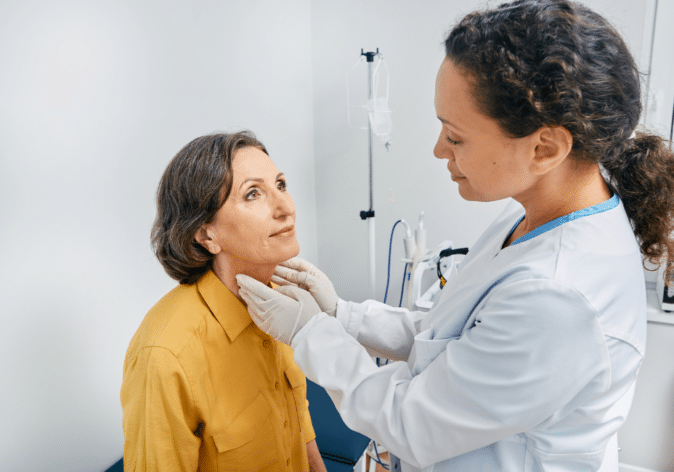What is Metastatic Breast Cancer?
Metastatic breast cancer, also known as advanced, secondary or stage four breast cancer, occurs when cancer cells break away from the cancer in the breast and move through the blood vessels or lymphatic vessels and form a new cancer growth in other parts of the body.
Dr David Okonji is a medical oncologist at Wellington Hospital in New Zealand, who is researching metastatic breast cancer, asking the question, are we curing HER-positive metastatic breast cancer? He was a guest speaker at the 2022 Breast Cancer Trials Annual Scientific Meeting, and we asked Dr Okonji to explain his research on this topic.
“I think we’re making huge leaps and bounds, and the prospect of a cure is becoming more of a reality in today’s age. Whether we’ve achieved that just yet is a matter of debate. But having said that, there’s very different ways that people view cure. If you ask a patient what cure means, it might be very different from what an oncologist thinks cure is.”
Listen to the Podcast
Listen to our conversation with Dr David Okonji as he discusses the HER+ Metastatic Breast Cancer.
Are We Curing HER+ Metastatic Breast Cancer?
“I think most patients look at cure as ‘have I lived longer than I expected to and is my quality of life great’? So, in their mind, if they thought they were going to live, say three months and 10 years later, they’re still alive often they will compute that in their mind as being cured. They might not use those words, they might say the cancer is in remission, but in effect the way they’re living their lives and the fact that they are devoid of same major symptoms, would be tantamount to saying cure.”
“On the other hand, if you’re using an academic description of ‘cure’ or definition for that matter, you’d probably want to say that ‘cure’ is not having any cancer in your body whatsoever and being able to live your life as if this had never happened in the first place. That reality is unlikely to be the case.”
“But in many respects, that might be a redundant thing to think about if the patient lives beyond the expectations and dies or something else totally unrelated to cancer or the treatment they’re receiving.”
“It is possible that one day we could cure metastatic breast cancer. Metastatic breast cancer means many things and there are very many sub definitions of what metastatic disease might be.”
“I think it depends on the extent and burden of the disease. Say, for example, we have a patient with only one single metastatic lesion in the body, that can be amenable to a reception surgically or even high dose radio belated doses of treatment. And in so doing, we rid them of the disease in effect if there’s no sign of cancer in the body. Then you can say that they’ve been cured of it.”
“Now, the real strength of courage here would be whether we could then choose not to give them any treatment thereafter. In such a case, if the disease was not to come back and the patient was to live without any symptoms, they would effectively to be cured.”
“On the other hand, if have someone has disease right throughout the body involving multiple organs, and then again you start treatment, and without treatment, whether that be with anti-HER2 therapy as we have today, you’re able to render them rid of the disease to the extent that there is nothing that you can find when you scan them, when you examine them and when you do relevant blood tests to monitor the tumour activity. In many respects, they are free of the cancer.”
“The question is whether the threshold has been reached within the bloodstream to say that there’s no cancer whatsoever. In many ways, that’s an academic question because as they live their lives and how they look, they’re free of cancer.”
“The question is whether one is brave enough once again to stop the treatment that has caused them to be free of the cancer. But if they’re tolerating that treatment quite well and the only inconvenience is the time they’ve got to spend, say once every three weeks for an hour, to receive the treatment, then they probably are cured of cancer theoretically. There’s many things we do in our lives that take perhaps one hour a day which we see as an inconvenience but doesn’t stop us living our lives.”
How is Treatment for HER+ Different to Other Types of Breast Cancer?
“As we know, there are various subtypes of breast cancer, broadly speaking, we have oestrogen-receptor positive breast cancer, triple-receptor negative breast cancer, and HER2-positive breast cancer. Even within those subtypes, there are further subtypes in each one of those groups.”
“If we broadly look at HER2-positive breast cancer, the biggest change that we’ve seen over the last 20-25 years is the explosion of different systemic therapy available for HER2-positive breast cancer. Some of it involves chemotherapy, others involve HER2-directed antibodies. And more recently we’ve got antibody directed drug conjugates.”
“These are different ways of delivering treatment. But I think what remains the significant factor in all these treatments is the fact that there is one target that remains relatively conserved, and that’s the HER2-receptor. Provided the cancer remains HER2-receptor addicted, there’s a target that we can treat with various iterations of different drugs with different mechanisms of action.”
Unfortunately, in the other subtypes of breast cancer there isn’t one particular receptor, so to speak, that we can target repeatedly and see such dramatic responses. Say for example, oestrogen-receptor positive breast cancer. At some point the cancer becomes resistant to oestrogen-receptor directed therapy, and one has a segue to use chemotherapy.”
“This seems less so with HER2-positive breast cancer, where you can give various iterations of HER2 directed therapy, and then paradoxically get amazing responses reproduced time and time again, even the first, second, third and sometimes sixth line and beyond. And I think that’s what makes the difference in HER2-positive breast cancer. The number of treatments made available that are effective that result in long term durable responses and sustained survival.”
“First of all, the future is bright I think, I’m optimistic. From the presentation I made today, there’s about 10% of patients over a period of about 10-years continuously, who remain alive whilst having ongoing metastatic breast cancer and HER2-directed therapy.”
Dr Okonji’s Hope for the Future
“The question is whether we can improve those numbers from being 10% in 10-years, to say 50% in 10-years. That is the ontological leap that we must try to achieve and reach out for. And that is where most of the study I believe will be going into.”
“In summary, identifying who those long-term responders are, recognising there are very few, and then developing more treatments that will target the vast majority who at some point appear to become resistant to treatment, so that we can put them into the group of the long-term responders.”
Support Us
Help us to change lives through breast cancer clinical trials research



